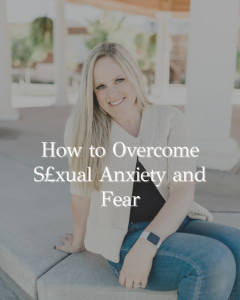
Have you ever felt like your sex life is stuck in a predictable, comfortable routine? It’s not unusual to feel this way but how do you get out of it? Let me answer that question and more in this episode. We will talk about a concept called “Sexual Leftovers,” those things that feel safe and not too scary in the bedroom, instead of the intimate connection that you want sex to be. And we will talk about how to address those underlying anxieties that keep you and your partner from enjoying your sex life to the fullest. There is no need to be stagnant. You can reignite that spark!
Show Summary:
Have you ever felt like your sex life is stuck in a predictable, comfortable routine—one that feels more about staying safe than exploring true passion? Or maybe you’ve noticed that certain things are ‘off-limits’ in your sexual relationship, but you’re not quite sure why. Today, we’re diving deep into a concept introduced by Dr. David Schnarch called ‘sexual leftovers.’ This idea might explain why your sexual relationship feels stagnant and, more importantly, how you can reignite the spark by addressing the underlying anxieties that keep you and your partner from fully enjoying your intimate connection. We’ll also explore how men and women, or higher desire and lower desire partners, might approach this concept differently, offering strategies for each to overcome these challenges.
Understanding Sexual Leftovers:
Dr. David Schnarch’s concept of sexual leftovers suggests that much of what we do in our sexual relationships isn’t driven by pure desire or passion. Instead, it’s often dictated by the developmental tasks or emotional challenges we’re trying to avoid or that our spouse is trying to avoid. Essentially, our sexual habits and routines are formed not by what we’re most excited to explore, but by what we’re most afraid to confront.
Over time, couples often start to eliminate certain sexual behaviors, fantasies, or conversations because they trigger discomfort, insecurity, or fear. These fears might be rooted in past experiences, cultural or religious beliefs, or simply the anxiety of stepping outside one’s comfort zone. The result is that only the ‘leftovers’—the safe, predictable activities—remain in the sexual repertoire, leading to a routine that feels increasingly disconnected from true desire.
Consider a couple where one partner fantasizes about incorporating role-play into their sex life but hesitates to bring it up, fearing their partner will think it’s ‘weird’ or won’t be interested. This fear of rejection leads them to stick with the same few activities they know their partner enjoys. Over time, this avoidance solidifies into a pattern, where their sex life remains in a narrow, predictable range. Even though the fantasy could add excitement, it’s ruled out because of the anxiety around the potential conversation.
Regressive behavior in the bedroom often stems from a place of emotional safety. When we avoid confronting our insecurities or anxieties, we regress to simpler, safer forms of interaction. This regression isn’t just about avoiding certain sexual acts; it’s about avoiding the emotional growth that those acts might require.
Imagine a couple who started their relationship with a lot of sexual exploration and adventure. However, as the years went by, they experienced a few negative interactions—maybe one partner felt judged or rejected during a particular activity. To avoid those uncomfortable feelings, they gradually stopped experimenting and regressed to a more routine, predictable sex life. While this routine may feel safe, it also limits the potential for deeper connection and satisfaction.
Why We Experience Sexual Anxiety:
Sexual anxiety is complex and can be rooted in various aspects of our personal history, cultural background, and relational dynamics. It’s not uncommon for this anxiety to manifest in the form of avoidance, where we sidestep certain behaviors or conversations because they bring up uncomfortable feelings. Vulnerability is at the heart of many sexual anxieties. Being vulnerable means exposing yourself—your desires, your body, your emotions—to another person. This exposure can feel risky, especially if you’ve been hurt in the past or if you fear judgment.
One might avoid initiating sex or suggesting new activities because they fear their partner might reject their ideas or think less of them. This fear might stem from past experiences where they felt judged or misunderstood in a sexual context. The result is a sex life that becomes more about maintaining safety than exploring true intimacy.
Cultural and religious teachings can also have a profound impact on how we view sex, often instilling a sense of shame or guilt around certain behaviors. These internalized beliefs can create a deep-seated anxiety when it comes to exploring new aspects of our sexuality.
Someone who was raised in a conservative religious environment might struggle with the idea of expressing or even acknowledging their sexual fantasies. They might feel that certain desires are ‘sinful’ or ‘wrong,’ leading them to suppress those thoughts and stick to what they believe is ‘acceptable’ behavior.
Overcoming Sexual Anxiety and Expanding Our Sexual Repertoire:
The key to overcoming sexual anxiety and expanding our sexual repertoire so that we aren’t settling for leftovers is recognizing it as a barrier to deeper intimacy and pleasure. Once we acknowledge that fear and avoidance are holding us back, we can start to take steps to expand our sexual experiences and enrich our relationships. So how do we do this?
- Communication is Key:
Open, honest communication is the cornerstone of overcoming sexual leftovers. It’s essential to create a space where both partners feel safe to express their desires, fears, and boundaries without judgment. This kind of dialogue can help both partners understand each other’s anxieties and work together to gently push the boundaries of their comfort zones.
You might start by having a conversation about what you both enjoy most in your sexual relationship and what you’ve always been curious about but have been too afraid to try. This conversation could lead to small, manageable steps towards exploring new experiences, such as incorporating a new activity or fantasy into their routine. For example, you might agree to try out one new idea each month, starting with something simple like experimenting with different types of touch or setting the mood with different lighting or music. - Small Steps to Bigger Changes:
Overcoming sexual anxiety doesn’t mean jumping into the deep end of your fantasies right away. It’s about taking small, gradual steps that build confidence and comfort over time. Each small success can pave the way for more significant changes down the line.
If you’ve been stuck in a routine, start by making one small change each time you’re intimate. This could be as simple as exploring a new part of the house (like the living room instead of the bedroom), trying out a different position, or introducing a simple prop like a blindfold. Over time, these small changes can build the confidence to try more significant, adventurous activities. - Mindfulness and Being Present:
Practicing mindfulness during sex can be a powerful tool in reducing anxiety and enhancing pleasure. Mindfulness encourages you to stay present in the moment, focusing on the sensations and emotions you’re experiencing rather than letting your mind wander to worries or insecurities.
Practice mindfulness by spending a few minutes at the start of your intimate time simply focusing on your breathing and being present with each other. You might engage in a slow, deliberate form of touch that allows you to really connect with each sensation. By staying present, you can reduce the impact of anxious thoughts and enhance their overall experience.
How Men and Women, or Higher Desire and Lower Desire Partners, Handle This Differently:
Sexual leftovers can manifest differently depending on a person’s gender or their role as a higher or lower desire partner in the relationship. These differences can lead to unique challenges in overcoming sexual anxiety and expanding sexual experiences.
Men and women often experience sexual anxiety in different ways. For instance, men might feel pressure to always be sexually assertive and confident, leading them to suppress any insecurities they might have about their sexual performance or desires. He might avoid discussing his sexual anxieties because he feels it would make him appear ‘weak’ or ‘unmanly.’ This could lead him to stick to a routine that feels safe and avoids any situation where he might feel out of control.
Women, on the other hand, might feel more anxiety around body image or fear of judgment for expressing certain desires. She might feel anxious about initiating sex or suggesting something new because she fears being labeled as ‘too forward’ or ‘inappropriate.’ Both partners end up avoiding growth in their sexual relationship due to these gendered anxieties.
A higher desire partner might be eager to try new things and push the boundaries of their sexual relationship, but they hold back because they don’t want to overwhelm or pressure their lower desire partner. Meanwhile, the lower desire partner might feel anxious about trying new things, fearing it will set a precedent or create expectations they can’t consistently meet.
This dynamic can lead to sexual leftovers, where both partners settle for a routine that’s comfortable but ultimately unsatisfying.
So how do we work through this?
For men, acknowledging and expressing their vulnerabilities can be a powerful way to break free from the pressure of societal expectations. Engaging in open conversations about their desires, fears, and needs can help reduce anxiety and lead to a more fulfilling sexual relationship.
For women, challenging internalized beliefs about sexuality and embracing their desires as natural and valid can help overcome the fear of judgment. Practicing self-compassion and exploring their own sexuality independently can also build confidence that translates into the relationship.
The higher desire partner can focus on creating a safe, non-pressuring environment where the lower desire partner feels comfortable exploring new things at their own pace. This might involve reassurance, patience, and open dialogue about boundaries and expectations.
The lower desire partner can work on understanding their own anxieties and communicating them openly. They might also explore ways to increase their sexual desire, such as through stress reduction, improving their body image, or engaging in self-exploration.
The Benefits of Expanding Our Sexual Relationship:
When couples actively work to overcome sexual leftovers and expand their sexual repertoire, they often experience profound benefits, both in their sexual relationship and their overall connection. It allows them to explore new dimensions of their relationship, leading to deeper intimacy and a stronger emotional bond. As partners become more comfortable expressing their desires and confronting their anxieties, they often find that their connection deepens both in and out of the bedroom and they often find greater satisfaction in their sex life. Trying new things can reignite passion, increase excitement, and lead to a more fulfilling sexual relationship.
Working through sexual anxieties and expanding one’s sexual experiences can also lead to significant personal growth. As individuals confront their fears and insecurities, they often gain a better understanding of themselves, which can lead to greater confidence and self-acceptance.
Conclusion:
Sexual leftovers might be a familiar concept in many relationships, but it doesn’t have to be a permanent state. By recognizing the anxieties and fears that keep us stuck in a predictable routine, we can begin to expand our sexual experiences and rediscover the excitement and intimacy that brought us together in the first place. Whether you’re navigating this journey as a man, a woman, a higher desire partner, or a lower desire partner, the key is open communication, patience, and a willingness to grow together. So, take that first step—have the conversation, try something new, and watch how your relationship can transform.
Remember, love is a journey, not a destination. Stay committed, stay passionate, and stay connected. Goodbye for now.



